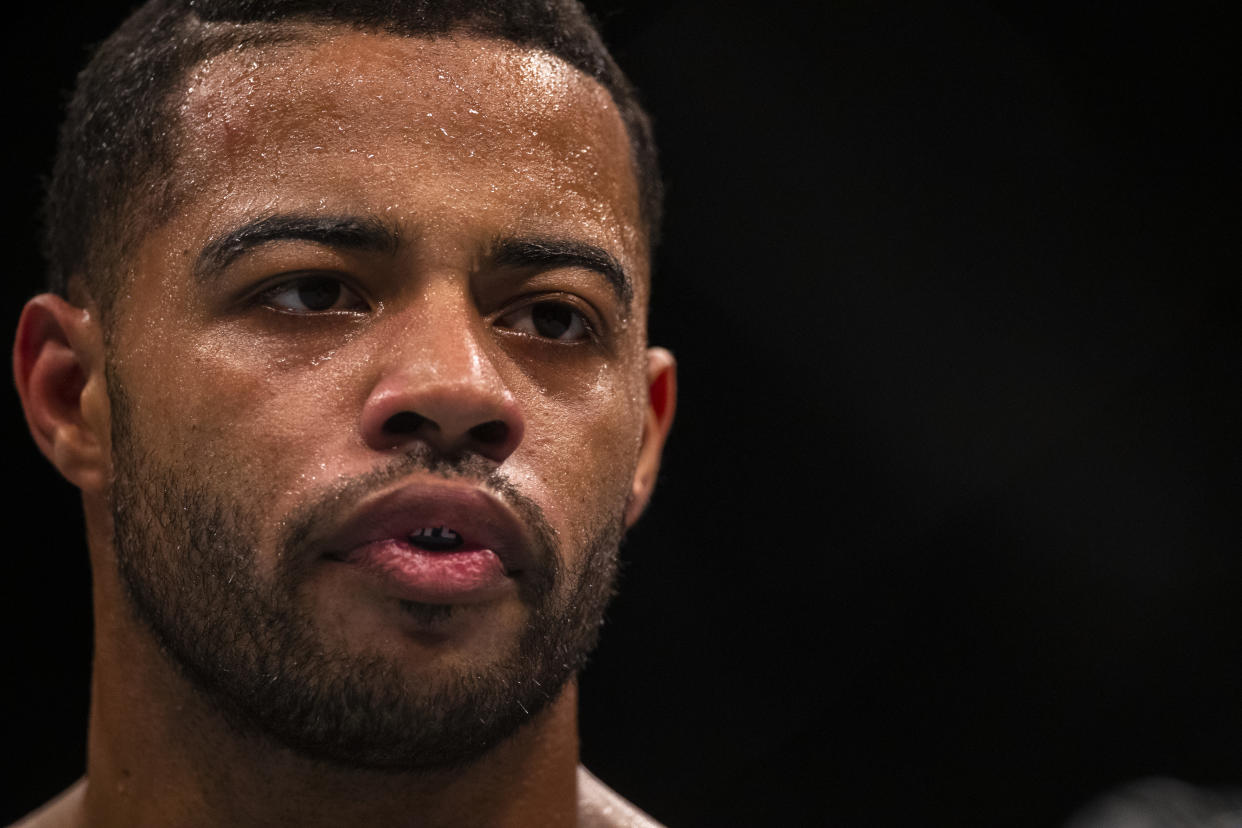Fighting in a cage doesn't compare to Trevin Giles' full-time job as a police officer

Every fighter, even the best, has pre-bout jitters. It comes with the territory. Trevin Giles is no different.
But the anxiety before a fight is nothing to the adrenaline rush Giles gets on an almost daily basis in his full-time job.
Giles recently went through the police academy and is now a full-time patrol officer for the Houston Police Department. It is, he says, an intimidating job under normal circumstances.
“It is a scary job, and if it’s not scary to you, you’re not setting yourself up to go home at the end of the day,” he said.
There are two words, though, that get Giles’ heart pounding and his adrenaline rushing every time he hears them come over the radio in his patrol vehicle: Code 1.
Every police department has different codes, but for Houston, Code 1 is an urgent call/threat to life. Those are the moments when his job choice becomes very real, and his side job of fighting another man in a cage doesn’t seem all that bad.
Giles, who is trying to rebound from his first pro loss after 11 consecutive wins to open his career, will take on Gerald Meerschaert on Saturday on the preliminary card of UFC on ESPN 5 at the Prudential Center in Newark.
He’s excited about the opportunity because, after a year-and-a-half off to go through the police academy, this is his second fight in three months.
He knows he’s in for a tough match and said Meerschaert “is a tough dude” who is difficult to finish.
As he tries to build both his police career and his UFC presence, Giles has learned to separate the two. There are aches and pains and cuts and bruises that come from a fight; police work is a lot more dangerous.
“The danger, every day, is very real and you have to be aware of that,” Giles said. “Being a police officer makes fighting feel like nothing. What’s the worst that’s going to happen to you in a fight? Losing? I wouldn’t say losing’s the worse. Getting injured and not being able to fight. That’s probably it. But what I’ve come to realize in this job is the problems that people have to deal with every day. Life is so hard. I had a call to respond to a motorcycle accident scene, and a guy’s family sees him stretched out across the street bleeding and everything.
“Things happen on my police job every day that are just, well, some are flat-out dangerous, some are emotional, so many things. It’s a hell of a lot tougher than anything we can go through in the cage. There are jitters in the cage, but when I’m working and I get Code 1, that means someone’s in danger. It’s our highest priority. A real loud beeping noise comes over the radio and that’s when you know it’s going down. It could be a shooting; it could be anything. Going to something like that and not knowing really what you’re walking into, I mean, that’s as hard as it gets.”
Giles knows he’d probably progress as a fighter quicker if he weren’t a full-time police officer. But he’s also not ready to give up the job that provides for his family so well.
He got into MMA by accident. He was a high school football player and went to college at Texas Southern. He saw a sign where the team was going for open workouts for anyone who wanted to walk on.
To prepare, Giles started doing MMA training. He fell in love with MMA and forgot quickly about football.
“It’s really addicting and the better I got and the more I learned, the more I loved it and the more I wanted to do it,” he said.
He went 9-0 on the regional circuit before landing a spot with the UFC. He won his first two bouts, stopping James Bochnovic at UFC 213 and then Antonio Braga Neto on a fight night card. He took off after that to go through the police academy, and returned in May.
He was submitted with less than a minute remaining in his fight with Zak Cummings to suffer his first career loss.
That gnaws at him, but he still believes he has a lot of growth as a fighter.
“I don’t think I’m close to my potential yet, honestly,” he said. “I’m finally getting to the point where fighting is feeling like sparring. … I feel like I’m making progress and I’m getting there slowly but surely, but I still have a ways to go.”
More from Yahoo Sports:

 Yahoo Lifestyle
Yahoo Lifestyle 

